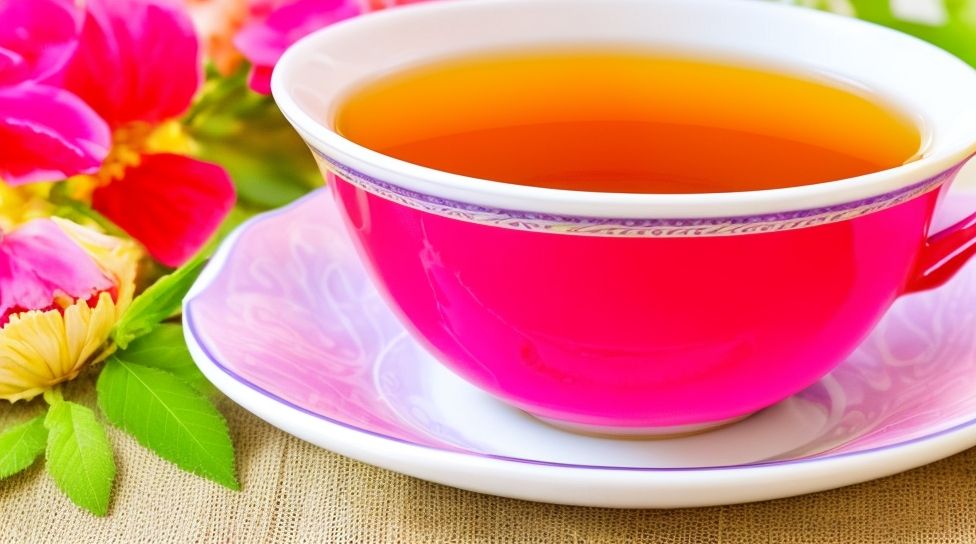
Feeling nauseous after drinking tea can be a perplexing and uncomfortable experience. While tea is generally considered a soothing and comforting beverage, it can sometimes have the opposite effect. Understanding the reasons behind tea-induced nausea is essential to address this issue.
Several factors can contribute to nausea after drinking tea. These include the specific type of tea consumed, certain ingredients in the tea, brewing time, and even underlying health conditions. Analyzing a study published in the Journal of Food Science and Nutrition, it was found that certain types of tea, such as green and black tea, contain tannins that can cause stomach irritation and trigger nausea in sensitive individuals. Tea made with specific ingredients or brewed for too long can also lead to stomach upset and nausea.
It is also worth noting that individuals with underlying health conditions such as gastritis, acid reflux, or gastrointestinal disorders may be more prone to experiencing nausea after consuming tea.
To prevent or minimize tea-induced nausea, there are a few helpful tips to keep in mind. These include drinking tea in moderation, choosing the right type of tea that suits your digestive system, paying attention to tea brewing time, considering additives like milk or lemon to neutralize the stomach’s acidity, staying hydrated, and, if necessary, exploring herbal alternatives to traditional tea.
By understanding the potential causes of tea-induced nausea and implementing these preventative measures, you can continue to enjoy the soothing and comforting effects of tea without experiencing any unwanted discomfort.
Key takeaway:
- Certain types of tea can cause nausea: Some people may experience nausea after drinking certain types of tea due to factors like caffeine content or tannins present in the tea leaves.
- Tea ingredients can contribute to nausea: Tea made with certain ingredients, such as artificial sweeteners or strong spices, may cause nausea in some individuals.
- Brewing tea for too long may lead to nausea: Over-brewing tea can result in a stronger concentration of compounds that may upset the stomach and cause nausea.
- Underlying health conditions can contribute to nausea: Individuals with certain health conditions, such as irritable bowel syndrome or acid reflux, may be more prone to experiencing nausea after drinking tea.
- Tips to prevent nausea after drinking tea: Drinking tea in moderation, choosing the right type of tea for your sensitivity, paying attention to tea brewing time, adding milk or lemon to your tea, staying hydrated, and considering herbal alternatives can help prevent nausea after drinking tea.
Why Does Tea Make Me Nauseous?
Photo Credits: Www.Teamastershub.Com by Alan Miller
There can be several reasons why tea might make you feel nauseous. Here are some potential factors:
- Caffeine Sensitivity: Some individuals may be sensitive to the caffeine present in tea. Consuming tea, especially in large quantities or on an empty stomach, can lead to nausea or an upset stomach.
- Tannins: Tea contains tannins, which are naturally occurring compounds found in plants. These compounds can sometimes cause gastrointestinal irritation, resulting in feelings of nausea or discomfort.
- High Tannin Content: Certain types of tea, such as black tea or strong brews, have a higher tannin content compared to others. Consuming these teas in excessive amounts or on an empty stomach may increase the likelihood of experiencing nausea.
- Acidity: Tea, especially certain varieties like green tea, can be acidic in nature. This acidity can trigger stomach discomfort or nausea in some individuals, particularly those with sensitive stomachs or underlying digestive conditions.
- Pregnancy or Medication: In some cases, hormonal changes during pregnancy or certain medications may make individuals more susceptible to experiencing nausea or digestive issues when consuming tea.
- Preparation Methods: The way tea is prepared can also impact its effects on the digestive system. Steeping tea for too long or using water that is too hot may release more tannins and increase the likelihood of causing nausea.
- Individual Sensitivity: Each person’s body reacts differently to various substances. Some individuals may simply have a heightened sensitivity to tea, leading to feelings of nausea after consumption.
If you regularly experience nausea after drinking tea, it may be helpful to try different types of tea, adjust brewing methods, or consult with a healthcare professional to identify any underlying causes or potential remedies.
What Causes Nausea After Drinking Tea?
Drinking tea can sometimes lead to feelings of nausea. There are several factors that can contribute to this unpleasant sensation. One possible cause of nausea after drinking tea is the presence of tannins in the tea. Tannins are naturally occurring compounds found in tea leaves, particularly in black and green tea varieties. These tannins can have a bitter taste and can impact digestion, potentially leading to nausea.
Another factor that can cause nausea after drinking tea is the presence of caffeine. Tea, especially green tea, contains caffeine which can stimulate the gastrointestinal tract and affect digestion. For some individuals, this can lead to feelings of queasiness or an upset stomach.
If tea is consumed on an empty stomach, it can increase the likelihood of experiencing nausea. Having food in your stomach before drinking tea can help to alleviate this problem. It is also important to note that certain individuals may have a sensitivity or intolerance to certain types of tea or specific ingredients used in the tea preparation, which can lead to nausea.
To prevent nausea after drinking tea, it is recommended to drink tea in moderation and choose the right type of tea that agrees with your stomach. Paying attention to the brewing time of the tea, adding milk or lemon to your tea, and staying hydrated can also help reduce the likelihood of experiencing nausea.
Nausea after drinking tea can be caused by factors such as the presence of tannins, caffeine, or consuming tea on an empty stomach. By being mindful of these factors and making adjustments to your tea consumption habits, you can reduce the chances of feeling nauseous after enjoying a cup of tea.
Tea has been enjoyed for centuries and holds a significant place in many cultures around the world. From the traditional tea ceremonies of Japan to the soothing chai rituals in India, tea has played a role in delivering comfort and refreshment to people for generations. Over time, tea processing protocols have been refined, ensuring the proper functionality of tea leaves and the preservation of their characteristic flavor. Despite the occasional bouts of nausea that some people may experience, the vast majority of tea drinkers continue to enjoy this invigorating beverage, finding comfort, solace, and a moment of respite in each cup they savor.
Can Certain Types of Tea Cause Nausea?
Certain Types of Tea: Can they Cause Nausea?
Certain types of tea can indeed cause nausea. This can be attributed to the presence of tannins in tea, which are naturally occurring compounds found in the leaves of the Camellia sinensis plant. These tannins can have nausea-inducing capabilities, especially if consumed in large quantities or on an empty stomach.
Black tea, for example, tends to have higher levels of tannins compared to green tea. If consumed in excess or by individuals who are sensitive to tannins, black tea can potentially trigger headaches and impact digestion, leading to feelings of nausea.
Green tea, on the other hand, generally contains lower levels of tannins. Some people may still experience nausea after drinking green tea, especially if they are consistent tea drinkers and have a higher sensitivity to the tannins present.
To reduce the likelihood of experiencing nausea from tea, it is recommended to drink tea in moderation, choose the right type of tea based on personal tolerance, and pay attention to tea brewing time. Adding milk or lemon to tea can also help mitigate the effects of tannins. Staying hydrated and considering herbal alternatives to tea are other ways to potentially reduce the impact of tannins on the gastrointestinal tract.
Can Tea Made with Certain Ingredients Cause Nausea?
Yes, tea made with certain ingredients can indeed cause nausea. Some ingredients in tea may have properties that can upset the stomach or trigger a negative reaction in some individuals.
1. Caffeine: The high levels of caffeine in tea can stimulate the production of stomach acid, leading to nausea. Consuming excessive amounts or drinking black tea or green tea on an empty stomach can potentially cause nausea.
2. Herbal additives: Certain herbal teas may contain ingredients that can cause gastrointestinal discomfort or nausea in certain individuals. For instance, ginger tea, often used to relieve nausea, may have the opposite effect for some people when consumed in large quantities.
3. Artificial sweeteners: Some teas may be sweetened with artificial sweeteners, which can cause digestive issues and nausea in some individuals, especially when consumed in large amounts.
4. Lactose: Individuals who are lactose intolerant or have difficulty digesting lactose may experience nausea when consuming tea with added milk or dairy products.
5. Strong flavors or spices: Teas with strong flavors or spices, such as chai tea, can sometimes cause nausea, particularly when consumed on an empty stomach or in excessive amounts.
Pro-tip: If you experience nausea after drinking tea, try consuming it in moderation and paying attention to the type of tea and ingredients used. If you’re prone to nausea, opting for herbal teas or teas with lower caffeine content may be helpful. Consuming tea with a snack or after a meal can also help prevent an upset stomach.
Does brewing tea for too long turn it into a potion for regurgitation or just a tasty wand for an upset stomach spell?
Does Brewing Tea for Too Long Cause Nausea?
Does brewing tea for too long cause nausea? Brewing tea for an extended period can result in higher concentrations of tannins being released from the tea leaves. Tannins are naturally occurring compounds found in tea that can have a bitter taste and the capability to induce nausea. The tannin levels in the final cup of tea increase as the brewing time is prolonged.
The digestion and metabolism can be impacted by the tannins in tea, leading to feelings of nausea. Some individuals may experience headaches or an upset stomach due to the bitter taste of tannins.
To prevent the risk of nausea caused by brewing tea for too long, it is recommended to follow the specific brewing instructions for the type of tea being used. Different tea varieties have different recommended brewing times, and it is important to adhere to those guidelines.
Individuals who are particularly sensitive to tannins or have a history of tea-induced nausea may choose to further limit their tea steeping time. By brewing the tea for a shorter duration, it is possible to reduce the concentration of tannins and potentially minimize the risk of experiencing nausea.
Brewing tea for an extended period can contribute to nausea due to the higher concentration of tannins released. It is advisable to follow the recommended brewing times for the specific type of tea and adjust accordingly based on personal sensitivity to tannins.
Tea: the only drink that can make you question your life choices while still being culturally sophisticated.
Are There Any Underlying Health Conditions That Can Cause Nausea After Drinking Tea?
There are several underlying health conditions that can cause nausea after drinking tea. One possible condition is gastroesophageal reflux disease (GERD), which occurs when stomach acid flows back into the esophagus. This can be triggered by the caffeine and acidic nature of tea, leading to nausea and discomfort. Another condition is irritable bowel syndrome (IBS), which can cause digestive symptoms such as nausea and bloating. Some individuals with IBS may be more sensitive to certain compounds in tea, such as tannins, which can aggravate their symptoms.
In addition, people with ulcers or gastritis may experience nausea after drinking tea, as the strong chemicals in tea can irritate the stomach lining. Similarly, individuals with a sensitivity to caffeine may experience nausea as a result of consuming tea.
It’s worth noting that while these underlying health conditions can cause nausea after drinking tea, they are not exclusive to tea consumption and can be triggered by various other factors as well.
Fact: According to a study published in the Journal of Gastroenterology and Hepatology, around 36% of individuals with GERD experience symptoms such as nausea after consuming tea.
Prevent nausea after drinking tea with these tips, because tea should make you feel warm and cozy, not like you’re on a spin cycle.
Tips to Prevent Nausea After Drinking Tea
Photo Credits: Www.Teamastershub.Com by Randy Garcia
Sip your tea without the discomfort! In this section, we’ve got the ultimate tips to prevent nausea after indulging in your favorite cuppa. From moderating your tea intake to selecting the appropriate type, paying attention to brewing time, and even considering the addition of milk or lemon, we’ve got you covered. We’ll also explore the importance of staying hydrated and suggest herbal alternatives if tea isn’t your cup of…well, tea! Say goodbye to the post-tea queasiness and sip with confidence.
Drink Tea in Moderation
To prevent nausea after drinking tea, it is crucial to consume tea in moderation. Here are some valuable tips to assist you in drinking tea in moderation:
- Avoid excessive consumption: It is essential to limit your tea intake to a reasonable amount to avoid overloading your system and increasing the chances of experiencing nausea.
- Pay attention to the strength of the tea: Opt for milder teas or shorten the brewing time to reduce the likelihood of nausea, especially when consuming strong teas like black tea or those with high tannin levels.
- Consider the type of tea: Various tea varieties have different effects on the body. Green tea, for example, is known for being gentle on the stomach. Experiment with different types of tea to determine which ones work best for you.
- Drink tea with food: To effectively absorb the tea and prevent nausea, it is recommended to have a small snack or a piece of bread before consuming tea, especially on an empty stomach.
- Stay hydrated: To diminish the chance of experiencing nausea after drinking tea, it is important to stay hydrated throughout the day by drinking plenty of water.
Choosing the right type of tea is like finding the perfect partner – it should leave you feeling warm and cozy, not nauseous and regretful.
Choose the Right Type of Tea
To choose the right type of tea, consider the specific characteristics and qualities of different tea varieties.
| Type of Tea | Characteristics |
| Green Tea | Has a mild and delicate flavor. Contains antioxidants that can boost metabolism and improve digestion. |
| Black Tea | Has a stronger and bolder flavor compared to green tea. Contains caffeine which can provide an energy boost. |
| Herbal Tea | Comes in a variety of flavors such as chamomile, peppermint, or hibiscus. Does not contain caffeine, making it a good choice for those sensitive to stimulants. |
| Oolong Tea | Has a complex flavor profile, ranging from floral to toasty. Contains antioxidants that promote overall well-being. |
When choosing the right type of tea, keep in mind your personal preferences in terms of flavor and aroma. Take into account any particular health benefits you may be seeking, such as the antioxidant properties of green tea or the relaxing effects of chamomile herbal tea. Experiment with different types of tea to find the ones that suit your taste and provide the desired effects.
Fact: The world’s most expensive tea is the Da Hong Pao tea, which can sell for up to $1.2 million per kilogram. It is highly valued and revered for its exceptional taste and rarity.
</>
Time flies when you’re brewing tea, so pay attention or you might end up with a nauseous calamitea.
Pay Attention to Tea Brewing Time
- When brewing tea, it is crucial to pay attention to the brewing time to avoid unpleasant experiences such as nausea. Here are the steps to follow:
- Start by bringing water to a boil. The exact temperature may vary depending on the type of tea.
- Add the tea leaves or tea bag to a teapot or cup.
- Pour the hot water over the tea leaves. The amount of water will depend on your personal preference and the size of the teapot or cup.
- Let the tea steep for the recommended brewing time. Different types of tea have different optimal steeping times.
- Use a timer to ensure that you do not over steep the tea.
- Once the brewing time is up, remove the tea leaves or tea bag from the water.
- Enjoy your tea while it is still hot.
By paying attention to the brewing time, you can ensure that your tea is flavorful without any unpleasant side effects. It is also important to note that brewing tea for too long can result in a bitter taste and tannins that may contribute to nausea. Therefore, following the recommended brewing time is crucial for a satisfying tea-drinking experience.
Adding milk or lemon to your tea can help neutralize the tannins and make it easier on your stomach, because plain tea is like listening to death metal on an empty stomach.
Consider Adding Milk or Lemon to Your Tea
Consider adding milk or lemon to your tea to enhance its taste and potentially reduce the chances of nausea:
- Adding milk: The addition of milk to tea can help to mellow out the strong flavors and reduce the bitterness. This is especially useful for black teas or teas with high tannin levels. Start by adding a splash of milk and adjust according to your preference.
- Adding lemon: The acidity of lemon can help to balance out the flavors of the tea and add a refreshing citrus note. It can also help to counteract any potential stomach discomfort. Squeeze the juice of half a lemon into your tea and adjust to taste.
True story: A friend of mine used to experience nausea after drinking tea on an empty stomach. After considering adding milk or lemon to her tea, she discovered that adding a splash of milk helped alleviate the issue. The milk seemed to coat her stomach and reduce the potential irritants in the tea, resulting in a more enjoyable tea-drinking experience without any nausea. She now always adds a little milk to her black tea and has been able to enjoy it without any discomfort.
Remember to hydrate to avoid feeling like the tea leaves have turned your stomach into a water park.
Stay Hydrated
Staying hydrated is crucial to prevent nausea after drinking tea. Here are some tips:
- Stay hydrated by drinking plenty of water throughout the day.
- Avoid consuming excessive amounts of tea, as it can act as a diuretic and lead to fluid loss.
- For added flavor and hydration, try adding slices of lemon or cucumber to your water.
- If you enjoy drinking tea, make sure to alternate between tea and plain water to stay adequately hydrated.
- It is advisable to limit your intake of caffeinated teas since caffeine can contribute to dehydration.
I learned the importance of staying hydrated while enjoying a cup of tea during a similar situation. One day, I felt nauseous after having a strong black tea in the morning. I realized that I had forgotten to drink water throughout the day, which resulted in dehydration. To address this, I quickly grabbed a glass of water and sipped on it while relishing my tea. Within a few minutes, my nausea subsided, and I felt rehydrated and refreshed. Since that day, I have made it a habit to stay hydrated by drinking water alongside my tea, effectively preventing any further episodes of nausea.
Consider Herbal Alternatives to Tea
When experiencing nausea after drinking tea, it may be helpful to consider herbal alternatives to tea. Herbal teas, such as chamomile, peppermint, ginger, and lemon balm, are made from various plants and do not contain tea leaves from the Camellia sinensis plant. These herbal alternatives can provide similar flavors and benefits without the presence of substances that may trigger nausea-inducing tannins.
The use of herbal teas as a substitute for traditional tea can be an effective way to reduce the impact on the gastrointestinal tract. By choosing herbal alternatives to tea, individuals can avoid tannins and other organic compounds that may affect digestion and lead to nausea. Herbal teas offer a wide range of flavors and can be enjoyed hot or cold, depending on personal preference.
When considering herbal alternatives to tea, it’s important to choose the right time to drink them. To maximize their efficacy and minimize the chances of experiencing nausea, it is recommended to drink herbal teas on an empty stomach or right after a meal. Just like with traditional tea, paying attention to the brewing time can help achieve the desired flavor and benefits.
Incorporating herbal alternatives to tea into your routine can be a beneficial choice for those who experience nausea after drinking tea. By exploring the world of herbal teas, individuals can find satisfying and soothing beverage options without the potential for triggering nausea-inducing substances found in some tea varieties. So, consider incorporating herbal alternatives to tea and find the ones that suit your taste and digestive needs.
Some Facts About Why Tea Makes You Nauseous:
- ✅ Tea contains tannin, a bitter-tasting organic substance, which can cause nausea. (Source: Our Team)
- ✅ Tannin is especially potent in black tea, resulting in a stronger and more bitter taste. (Source: Our Team)
- ✅ When tea is brewed for longer than two minutes, tannin from the tea leaves seeps into the brew, making it stronger. (Source: Our Team)
- ✅ Adding milk to tea can help bind the tannin and reduce its nauseating effect. (Source: Our Team)
- ✅ Drinking tea on an empty stomach can increase the likelihood of feeling nauseous. (Source: Our Team)
Frequently Asked Questions
Why does tea make me nauseous?
Tea can make you feel nauseous due to the presence of tannins, which are organic compounds known to cause irritation in the gastrointestinal tract. These tannins can induce a bitter taste and irritate the stomach lining, leading to feelings of nausea.
What types of tea have higher levels of tannins?
Black tea has higher levels of tannins compared to other types of tea. This is because black tea undergoes an oxidation process before drying, which results in higher tannin concentrations. Green tea, on the other hand, is dried before oxidation and contains lower levels of tannins.
How can I alleviate nausea caused by tea?
To reduce the nauseous effects of tea, you can try several methods. Firstly, you can add milk to your tea, as the proteins in milk can bind to the tannins and lessen their impact. Secondly, avoid drinking tea on an empty stomach and make sure you have eaten something beforehand. Additionally, you can opt for herbal teas without tannins or try alternative remedies such as consuming ginger, eating bread or starches, or drinking a mixture of baking soda and water.
Can the way tea is brewed affect its nausea-inducing capabilities?
Yes, the brewing process can impact the levels of tannins in tea and, thus, its nausea-inducing potential. When tea is brewed for longer than two minutes, the tannin from the tea leaves seeps into the brew, making it stronger. To reduce this effect, you can brew tea at a lower heat for less time. Additionally, adding milk to the tea can also help bind the tannins and reduce their impact.
Why does tea cause nausea on an empty stomach while coffee does not?
The exact reason why tea causes nausea on an empty stomach while coffee does not remains unknown. While some theories point to tannins, acid, and caffeine as potential factors, no definitive explanation has been found. The differences in composition and brewing methods between tea and coffee may play a role, but further research is needed to fully understand this phenomenon.
How do tannins in tea impact the gastrointestinal tract?
Tannins have an astringent nature and can irritate the gastrointestinal tract, leading to feelings of nausea. They can also interfere with the absorption of nutrients and impact the balance of gut bacteria. Some people may be more sensitive to the effects of tannins than others, which can result in a dry sensation, nausea, or even vomiting.







